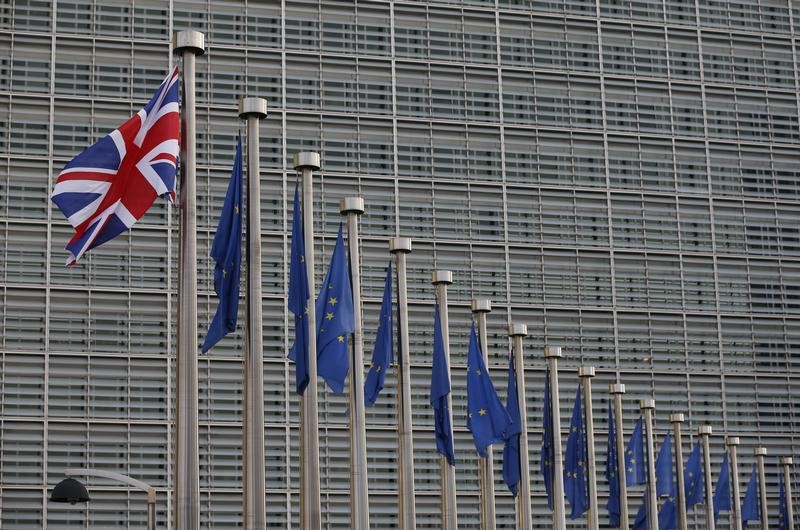 © Reuters. A Union Jack flag flutters next to European Union flags ahead of a visit of Britain’s Prime Minister Theresa May and Britain’s Secretary of State for Exiting the European Union David Davis at the European Commission headquarters in Brussels
© Reuters. A Union Jack flag flutters next to European Union flags ahead of a visit of Britain’s Prime Minister Theresa May and Britain’s Secretary of State for Exiting the European Union David Davis at the European Commission headquarters in BrusselsBy Jan Strupczewski
BRUSSELS (Reuters) – European Union leaders are to agree on Friday on a calendar until the middle of 2019 detailing when to tackle various changes to the bloc, including deeper euro zone integration, to strengthen the EU after Britain leaves.
The calendar, called the “Leaders’ Agenda” sets out a timetable for discussions on migration, defense, the next seven- year budget, European parliament composition, trade, top EU jobs and deepening the economic and monetary union.
The discussions are inspired by French President Emmanuel Macron, who last month offered an ambitious vision for European renewal as a counterweight to the negative impact of Britain’s exit from the EU in 2019, officials said.
Macron’s ideas, however, put strong emphasis on the further development of the euro zone, now encompassing 19 countries, which some officials say creates the risk of alienating the EU’s eight remaining members.
“The trick is how to use Macron and his energy without deepening divisions, but rather to push forward the whole flock of 27,” one senior official said.
According to the leaders’ calendar, they will kick off the discussion on the reform of the euro zone and completing their banking union at a euro summit in the middle of December.
Among the main ideas for a deeper integration of the single currency area are a separate euro zone budget, managed by a euro zone finance minister who would be responsible before a euro zone parliament.
There are also ideas of transforming the euro zone bailout fund into a European Monetary Fund, creating a euro zone unemployment insurance scheme or a rainy day fund as well as setting up a sovereign insolvency mechanism.
The calendar sets the summit on June 28-29 next year as the time when concrete decisions on such reforms must be taken.
To complete the banking union, leaders need to agree that the euro zone bailout fund is the financial backstop for the euro zone’s single resolution fund for banks, in case it runs out of money. This could be agreed already in December, officials said.
But the key element still mission from the banking union — a pan-European scheme to protect deposits — is likely to be more difficult because Germany is strongly against it, fearing its banking system might be called upon to pay off depositors of failing banks in other euro zone countries.
The calendar sets March 21-22 in 2019, a week before Britain leaves the EU, as the time when leaders should take any further decisions on euro zone reform.
Fusion Media or anyone involved with Fusion Media will not accept any liability for loss or damage as a result of reliance on the information including data, quotes, charts and buy/sell signals contained within this website. Please be fully informed regarding the risks and costs associated with trading the financial markets, it is one of the riskiest investment forms possible.
Source: Investing.com




























